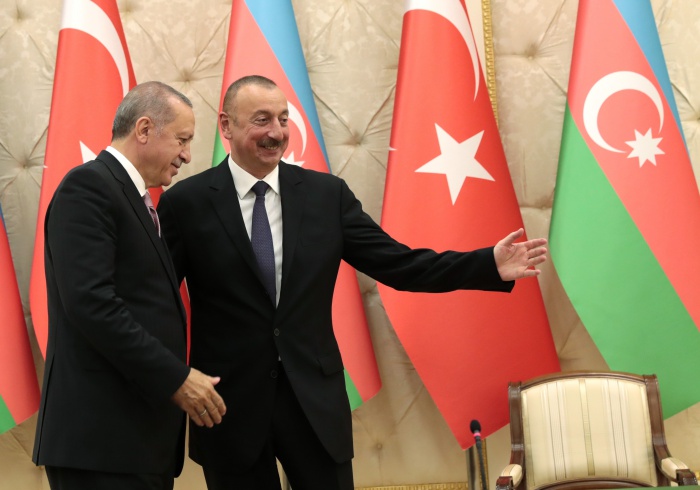Bellicosity and warmongering took hold of Turkish public discourse after reports of military gains for Azerbaijan against Armenian forces on Sunday over a disputed enclave ruled by a government recognized only by Armenia.
Azerbaijan and Armenia both declared martial law on Sunday after clashes over the disputed Nagorno-Karabakh region as they blamed each other for starting the aggression and mobilized their forces.
Azerbaijani officials claimed on Monday that they made significant gains in the territory, with AFP reporting that at least 23 people had been killed in clashes as of Monday.
Turkey declared unconditional support for Azerbaijan as the country’s president, Recep Tayyip Erdoğan, labeled Armenia “the biggest threat to peace in the region” and expressed full support for Azerbaijan’s armed forces.
“We stand by Azerbaijan with all of Turkey’s means. Our defense facilities are at Azerbaijan’s disposal,” İsmail Demir, the head of Turkey’s defense industry, said during a live broadcast on the pro-government Kanal 7 network on Sunday.
İbrahim Karagül, editor-in-chief of the prominent pro-government daily Yeni Şafak, on Monday called on the Baku administration “to make a bold decision and change its perspective on the regions under Armenian occupation and move the war towards Armenia.”
Karagül’s call for war came after a controversial tweet on Sunday when he suggested missiles should be launched toward Armenia’s capital of Yerevan.
“Missiles will ‘mistakenly’ fall on Yerevan city center,” Karagül tweeted.
Since the beginning of the flare-up in tensions on Sunday, Turkey’s state-run TRT has been broadcasting video clips displaying alleged destruction of Armenian military hardware by Turkish-made armed drones with martial music glorifying the hits.
Zafer Arapkirli, a journalist from the Cumhuriyet daily, criticized the government for endorsing moderation with Armenia in the late 2000s.
Arapkirli tweeted on Sunday that “the people who prevented Azerbaijanis waving flags from entering a friendly [soccer match] between the Turkish and Armenian national teams in a bid to avoid a provocation have no right to speak now.”
A photo posted on Armenia’s official Twitter page showing a religious figure with an assault weapon circulated widely on social media, with comments amounting to racial slurs and hate speech toward Armenians.
“Turkey is the only country that supports a war in the Armenia-Azerbaijan clashes that started today. While all the countries and international bodies call for a ceasefire, the palace [the Erdoğan administration] and its media continue warmongering. War is a catastrophe,” Garo Paylan, a deputy of Armenian descent from the pro-Kurdish Peoples’ Democratic Party (HDP), tweeted on Sunday.
Ünal Çeviköz, vice chair of the opposition Republican People’s Party (CHP), said on Sunday that there are sources accusing Ankara of sending militants from Syria to Azerbaijan to fight against Armenia.
“Unfortunately, reports suggest that Turkey sent armaments and jihadist groups to Azerbaijan,” Çeviköz said, drawing criticism from the ruling Justice and Development Party (AKP).
Bülent Turan, the AKP’s deputy group leader, said the statement would go down as a “black stain” on the CHP’s history.
“#Turkey, which annihilated #Armenians in their historical homeland & up until now justifies that crime, supports #Azerbaijan to carry out same genocidal acts in #SouthCaucasus. This genocidal Turkish-Azerbaijani alliance is serious threat to the region,” Armenia’s Ministry of Foreign Affairs’ said on its official Twitter page on Monday.
Turkey has backed Muslim-majority Azerbaijan in the decades-long conflict over Nagorno-Karabakh, a territory inside Azerbaijan where the population is predominantly ethnic Armenian. The region declared independence in 1991 under the name of the Republic of Artsakh, a government recognized only by Armenia.

